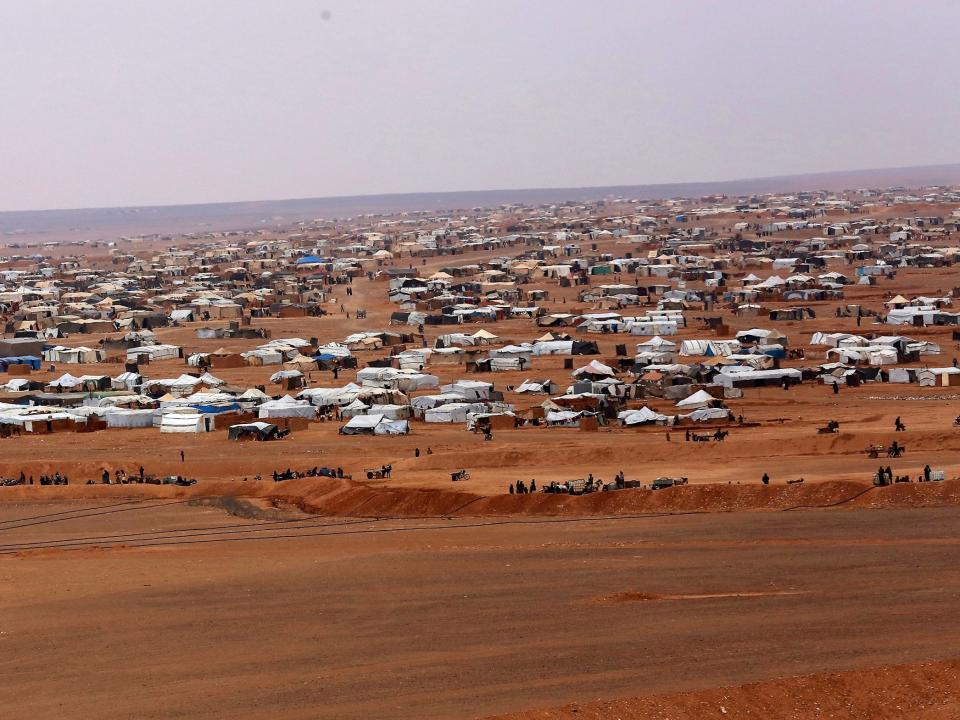Hundreds at risk of starvation in besieged Syrian border camp

Hundreds of people stranded at the border between Syria and Jordan are at risk of starvation after nine months without any aid deliveries and the severing of smuggling routes earlier this month.
Activists say a dozen have died of malnutrition and lack of access to healthcare in the last two weeks at Rukban camp – an isolated, tented settlement in the desert where some 45,000 displaced people now live, most of them women and children.
Among the victims was a five-day-old boy and a four-month-old girl who were unable to enter Jordan to reach a hospital, according to Unicef. Aid agencies have warned that many more are at risk.
“There is real hunger and severe malnutrition,” said Rula Amin, a spokesperson for the United Nations refugee agency, Unhcr.
She added: “Many are already suffering from skin diseases, respiratory illnesses and diarrhoea. With the harsh desert winter approaching, the conditions will worsen and so will the suffering of the civilians, especially the most vulnerable: the old, the sick and the children.”
Rukban camp is victim of a unique set of circumstances. It has been completely cut off from vital aid since January, when a deadly geopolitical standoff between opposing sides in Syria’s civil war deepened even further.
Since the last UN aid delivery nine months ago, the camp’s inhabitants have been barely sustained by food smuggled into the camp overland from other parts of Syria, but those routes were closed off by the Syrian army at the beginning of the month.
“Prices have tripled since then,” said Muayed al-Abeed, who has been at the camp for three years. “When it comes to food, the situation is worse than bad. Death is the only option now.”
The camp lies in a deconfliction zone set up by the Pentagon to protect a nearby US base in al-Tanf from attacks by pro-Assad forces. But in reality, US power is largely restricted to the skies. On the ground, access is blocked on one side by the Jordanian government, and on the other by the Syrian army.
“The easiest way of delivering aid would be overland via the Jordanian border, but Jordan has said emphatically that the camp is inside Syria and is the responsibility of the Syrian state,” said Sam Heller, senior analyst at the International Crisis Group non-governmental organisation.
Getting regular aid shipments to this camp would be really easy if not for the politics of the war and all these rival zones of influence that slice up the territory
Aron Lund, fellow at The Century Foundation think tank
An Isis suicide attack that killed six Jordanian soldiers at the Rukban crossing led to the closure of the border in 2016, and a number of attacks have occurred in the area since.
“The Jordanians are nervous about being saddled with the responsibility for a camp that they are convinced has been infiltrated by extremists and whose residents they don’t fully know or understand,” he added.
Following weeks of behind-the-scenes negotiations between the UN and the Syrian government, Damascus gave approval on Wednesday for the UN to deliver aid to the camp next week. But even with an agreement in place, there is no guarantee that deliveries will be allowed through.
“Every road is dotted with checkpoints for rival forces and unreliable proxies, and every attempt to deliver something along that road serves as an opportunity for them to exert leverage over each other,” Aron Lund, a fellow at the Century Foundation think tank, told The Independent.
“Getting regular aid shipments to this camp would be really easy if not for the politics of the war and all these rival zones of influence that slice up the territory,” he added.
As the situation in in the camp has deteriorated over the past three years, some residents have fled – returning to areas under government control as part of reconciliation agreements, or to Kurdish-held areas. But for many it is too dangerous or costly to return home.
One humanitarian worker involved with delivering aid, who spoke on condition of anonymity, said some armed groups in the camp were also preventing people from leaving.
“There are some militias that are concerned that if people start leaving they will lose the ability to survive. As long as there is big civilian population there will be aid, so they are clutching to them.”
As well as blocking cross-border aid deliveries, Jordan is severely restricting hospital treatment for those entering the country.
“I have a 14-year-old daughter who suffers a disease that is still unknown to us, I don’t know how to help her” said Mr al-Abeed. “I have asked everyone in the medical field at the camp, and no one has been able to diagnose her. Jordan does not admit people unless there is a full diagnosis.”
Following the deaths of the two children last week, Unicef called on Jordan to loosen those restrictions.
“While the UN-supported clinic near the border inside Jordan continues to provide basic health services for urgent life-saving cases, more sophisticated healthcare is required – this is only available in hospitals,” said Geert Cappelaere, Unicef regional director for Middle East and North Africa.
Colonel Sean Ryan, a spokesman for the US-led coalition, said Rukban was “a humanitarian tragedy” and “definitely an area of concern from the human perspective”.
He added: “The coalition has gone on record as standing by to enable the safe delivery of UN humanitarian relief to people living in the Rukban camp.”
The UN aid delivery approved on Wednesday is set to arrive on 25 October, and would be the first to reach the camp from Damascus.
– Additional reporting from Bahira Alzarier, in Amman

 Yahoo News
Yahoo News 